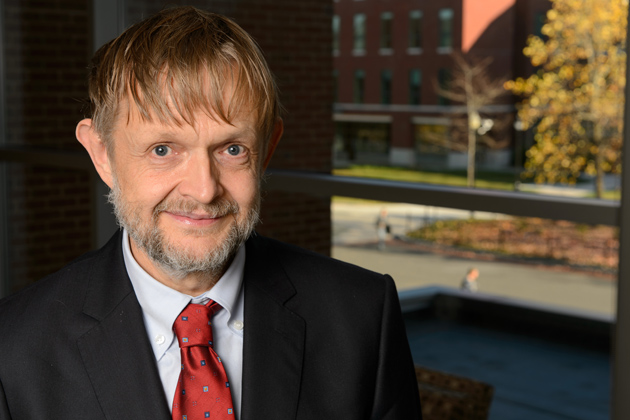
When Jerzy Weyman began studying mathematics at Brandeis University in 1978, he says the field was unrecognizable from what it is today. But most people, he says, think of math as something you learn in secondary school that has never changed – and will never really change.
“I was on a plane once with a man who asked me if anything had been discovered in mathematics since Euclid,” he says, referring to the Ancient Greek mathematician.
“But when I compare the situation today to when I was a graduate student, the amount of mathematical knowledge we have has doubled or even tripled,” he says. “Mathematics is developing faster than it ever has before.”
Weyman, the new Stuart and Joan Sidney Endowed Professor of Mathematics in the College of Liberal Arts and Sciences, joined UConn this fall from Northeastern University. He brings more than 30 years of expertise in theoretical mathematics, focusing particularly on abstract algebra. He has spent the fall semester doing research at the University of Duisburg-Essen in Essen, Germany, under the auspices of a Humboldt Research Prize from the German government.
Weyman likens his work to looking for patterns and solving puzzles, most of which have to do with symmetry and what he calls “beautiful characterizations” of classical groups. There are many different ways that objects and processes can be symmetrical to each other, he says, and his research gets at what describes these different kinds of symmetry.
“It was proved in the 1930’s that some types of symmetries can be classified, which led to the discovery and classification of simple Lie algebras,” he says, referring to a set of algebraic structures used to study the concept of infinitesimal mathematical transformations. “This was probably the most influential result of the 20th century.”
Mathematics is really present in all kinds of applications, from the Internet to rockets to TV sets.
Growing up in Poland, Weyman knew he was interested in mathematics when he started winning math competitions in 4th and 5th grade. The contests judged students by how fast they could calculate the answer to a problem.
But eventually, Weyman learned that not all math problems have a solution – something that he finds fascinating.
“Sometimes you have a problem that you can calculate to the very end, but sometimes, you can’t,” he says. “I want to understand that interface: the borderline between the solvable and the unsolvable.”
Weyman was drawn to UConn in part because of the impression he had two years ago, when he gave an invited talk in the Department of Mathematics. He was impressed with the caliber of work, and says he is especially interested in working with associate professors Ralf Schiffler and Kyu-Hwan Lee.
When he returns from Essen, Weyman is also keen to start teaching, which he says not only helps to develop students but also to develop his research.
“When you teach, it gives you another look at your areas of research,” he says. “You might notice something different about it from teaching it. When I’m teaching, my research is more productive.”
Weyman emphasizes that his and other mathematicians’ work forms the foundation of much of the sciences and engineering: without theoretical math, he says, we couldn’t send large files over the Internet, or even access the Internet in the first place.
“Engineers don’t like to call what we do mathematics – they would say it’s engineering,” he jokes. “But mathematics is really present in all kinds of applications, from the Internet to rockets to TV sets.”



